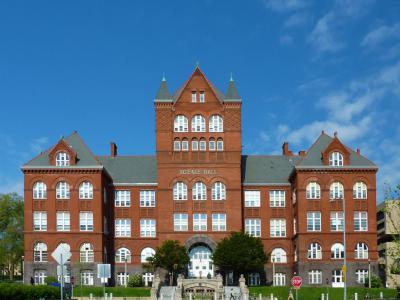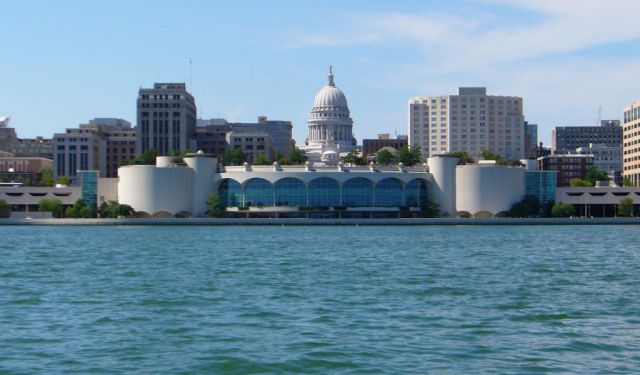University of Wisconsin Science Hall, Madison
The Science Hall was built in 1888 in a Romanesque Revival style by Milwaukee architect Henry C. Koch, with structural modifications by University of Wisconsin’s Civil Engineering Professor Allan D. Conover. This U-shaped building was a model of modern construction-melding red brick and rhyolite masonry with an early steel frame for fireproofing.
Science Hall originally housed nearly all of the university’s scientific disciplines; it was home to early instruction in geology, physics, zoology, botany, bacteriology, anatomy, and even medicine. It also hosted the country’s first courses in sedimentation, oceanography, and engineering geology, thanks to luminaries like Charles R. Van Hise, who later became university president and helped elevate the university’s geology program to national prominence.
With its broad façade punctuated by a five-story central tower and corner turrets, Science Hall evokes a stately red‑brick fortress. Its architecture blends strength and elegance: round‑arched windows, corbelled chimneys, and ornamental terra cotta-while the airy wings originally contained classrooms, laboratories, reading rooms, and a lecture hall seating nearly one hundred students.
In 1993, Science Hall was designated a National Historic Landmark, in recognition of its architectural significance and its critical role in America’s early scientific education. Still in academic use today, it houses offices and departments like Geography and continues to anchor the historic core of University of Wisconsin’s campus.
Beyond its academic legacy, Science Hall has a colorful lore-ghost stories and campus legends persist thanks to its past as home to anatomy labs and cadaver storage. Though most who tour it today won't encounter anything supernatural, the attic and back stairwells still intrigue visitors with faint echoes of its storied past.
Science Hall originally housed nearly all of the university’s scientific disciplines; it was home to early instruction in geology, physics, zoology, botany, bacteriology, anatomy, and even medicine. It also hosted the country’s first courses in sedimentation, oceanography, and engineering geology, thanks to luminaries like Charles R. Van Hise, who later became university president and helped elevate the university’s geology program to national prominence.
With its broad façade punctuated by a five-story central tower and corner turrets, Science Hall evokes a stately red‑brick fortress. Its architecture blends strength and elegance: round‑arched windows, corbelled chimneys, and ornamental terra cotta-while the airy wings originally contained classrooms, laboratories, reading rooms, and a lecture hall seating nearly one hundred students.
In 1993, Science Hall was designated a National Historic Landmark, in recognition of its architectural significance and its critical role in America’s early scientific education. Still in academic use today, it houses offices and departments like Geography and continues to anchor the historic core of University of Wisconsin’s campus.
Beyond its academic legacy, Science Hall has a colorful lore-ghost stories and campus legends persist thanks to its past as home to anatomy labs and cadaver storage. Though most who tour it today won't encounter anything supernatural, the attic and back stairwells still intrigue visitors with faint echoes of its storied past.
Want to visit this sight? Check out these Self-Guided Walking Tours in Madison. Alternatively, you can download the mobile app "GPSmyCity: Walks in 1K+ Cities" from Apple App Store or Google Play Store. The app turns your mobile device to a personal tour guide and it works offline, so no data plan is needed when traveling abroad.
University of Wisconsin Science Hall on Map
Sight Name: University of Wisconsin Science Hall
Sight Location: Madison, USA (See walking tours in Madison)
Sight Type: Attraction/Landmark
Guide(s) Containing This Sight:
Sight Location: Madison, USA (See walking tours in Madison)
Sight Type: Attraction/Landmark
Guide(s) Containing This Sight:
Walking Tours in Madison, Wisconsin
Create Your Own Walk in Madison
Creating your own self-guided walk in Madison is easy and fun. Choose the city attractions that you want to see and a walk route map will be created just for you. You can even set your hotel as the start point of the walk.
University of Wisconsin-Madison Walking Tour
Founded the same year as Wisconsin achieved its statehood – 1848, the University of Wisconsin in Madison (often simply referred to as UW Madison) is the oldest public university in the state and the flagship campus of the University of Wisconsin System. The UW Madison campus, located on the shores of Lake Mendota, includes four National Historic Landmarks. Complete with these and a sweeping view... view more
Tour Duration: 2 Hour(s)
Travel Distance: 3.5 Km or 2.2 Miles
Tour Duration: 2 Hour(s)
Travel Distance: 3.5 Km or 2.2 Miles
Madison Introduction Walking Tour
The Native Americans called the Madison area Taychopera, meaning "land of the four lakes" which are known today as Mendota, Monona, Waubesa, and Kegonsa. The first European settlement began in 1829 when James Duane Doty, a former federal judge, purchased over a thousand acres of land between Lakes Mendota and Monona.
The city was named after President James Madison and made the state... view more
Tour Duration: 1 Hour(s)
Travel Distance: 2.1 Km or 1.3 Miles
The city was named after President James Madison and made the state... view more
Tour Duration: 1 Hour(s)
Travel Distance: 2.1 Km or 1.3 Miles





